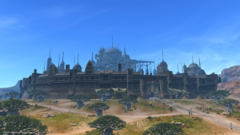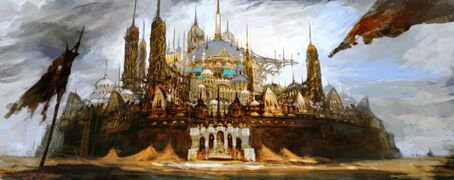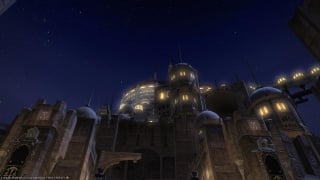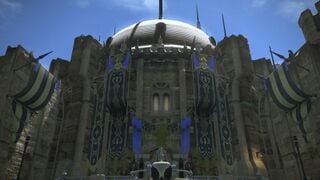Ul'dah
Ul'dah
- Type
- City
- Zone
- Thanalan
(Hydaelyn) - Aetherytes
- Ul'dah Aetheryte Plaza (X:8.2, Y:7.8)
“"For Coin and Country."
The bustling commercial hub of Ul'dah sits amid the desolate desert landscape of southern Aldenard. The city is organized strategically around the dome-shaped citadel at its center. Its towering fortifications and protective outer walls are visible for malms in all directions, and serve as a stark deterrent to would-be besiegers.— In-game description
General Information
“The bustling commercial hub of Ul'dah sits amid the desolate desert landscape of southern Aldenard. The city is organized strategically around the dome-shaped citadel at its center. Its towering fortifications and protective outer walls are visible for malms in all directions, and serve as a stark deterrent to would-be besiegers.
Visitors from every corner of Eorzea come to Ul'dah to partake of the city's famed recreation, most notably the fighting arenas and gambling halls. Ul'dahn culture is known for its affluence, and the wealth of the nation comes in large part from its abundant mineral resources and prestigious clothcrafting industry.
Historically, it is the sultan who claims sovereignty over Ul'dah, but true power is wielded by the Syndicate, an elite group of six of the most influential and richest members of society. Nald'thal is the patron deity of the city, and two great halls devoted to his two aspects can be found in the eastern and western sections of the city.— Game Description
Ul'dah is one of the starting cities in Eorzea. As a bustling commercial hub located in the desert of Thanalan, Ul'dah is a city state ruled by the Syndicate, a group of six of the most influential and wealthiest members of society. The economy of Ul'dah is based on clothcrafting and mining. Players with ![]() gladiator,
gladiator, ![]() pugilist, or
pugilist, or ![]() thaumaturge as their starting class begin the game in Ul'dah.
thaumaturge as their starting class begin the game in Ul'dah.
Ul'dah has the following Guilds:
- Gladiators' Guild
- Pugilists' Guild
- Goldsmiths' Guild
- Miners' Guild
- Weavers' Guild
- Alchemists' Guild
- Thaumaturges' Guild
Zones
Ul'dah consists of two zones, the Steps of Nald and the Steps of Thal. Teleporting into Ul'dah places you at the main Aetheryte, on the Steps of Nald.
Ul'dah - Steps of Nald
Ul'dah - Steps of Thal
The Goblet
Historical
During Legacy, Ul'dah was separated differently. There was a main lower area called Ul'dah - The Merchant Strip that encompassed both of the Steps of Nald and the Steps of Thal. The Hustings Strip was a separate area that had to be loaded into, unlike how it is now.
Lore
Amidst the arid deserts of southern Aldenard stands Ul'dah, a bustling commercial hub and ruler of the regions of Thanalan. The city rises suddenly from the malm upon malm of dusty wastes, protected from the blowing sands by the embrace of a stalwart fortress.
Flag

Ul'dah's flag bears upon a field of black a set of golden scales, which weigh the jewel of prosperity on the left and the flame of might on the right. This emblem itself originates in Belah'dia, where the scale weighed power and wisdom. Thus, the twin heirs to that ancient civilization took one sigil apiece: Ul'dah the flame, and Sil'dih the grapes of knowledge.
Motto
For Coin and Country
Government
Members of the Ul Dynasty claim their sovereignty by right of birth. Their will is carried out by the Divan, a group of eight viziers who oversee matters of law, finance, engineering, the interior, commerce, war, religious affairs, and palace affairs. However the influence of the sultans has been waning for some time, and at the present true power is wielded by the Syndicate, a council sat by six of Ul'dah's most elite and influential.
Leader
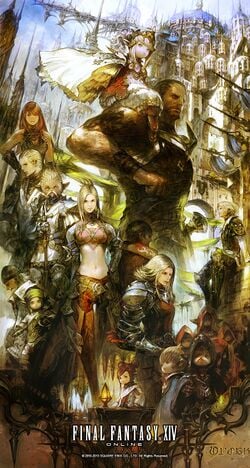
Sultana Nanamo Ul Namo, seventeenth in the line of Ul
Ruling Body
As a sultanate, all offices of government serve to manifest the will and policy of Ul'dahs ruler.
Racial Distribution
Midlander Hyur: 30%
Highlander Hyur: 10%
Dunesfolk Lalafell: 40%
Hellsguard Roegadyn: 10%
Other: 10%
Note: the race of refugees are not reflected in these numbers.
Religion
Nald'thal, the overseer of the underworld and god of commerce, is the guardian diety of Ul'dah. While many believe that He is possessed of a dual nature, Ul'dahns see Him as twins, and worship Nald and Thal separately. Since times of eld, the Order of Nald'thal has devoted itself to this task, and encourages the devout to donate their coin–for virtue in this life, and happiness in Thal's realm.
Guilds
Ul'dah is home to guilds representing gladiators, pugilists, thaumaturges, goldsmiths, weavers, alchemists, and miners.
Industries
Merchantry:
With a gateway to the five seas and roads to all corners of the realm, Ul'dah has long flourished as a center of commerce. Today, countless companies and consortia – both large and small – operate within the city-state.
Mining:
Beneath the lands of Thanalan run countless veins of quality ore, and, as a result, bustling jewelry trade has evolved.
Textiles:
In addition to crafting essential fabrics for everyday use, a large and prestigious apparel industry has grown under the auspices of an increasing number of wealthy people. As represented by Sunsilk Tapestries, a number of notable brands have become popular even outside of Ul'dah's borders.
Medicine:
Thanks to the tireless study of ailments and Frondale's Phrontistery, Ul'dah has established itself as a reputable producer of alchemical and traditional cures.
Entertainment:
The city-state offers something for seekers of pleasure, from gladiatorial displays in the Coliseum, gambling at the Platinum Mirage, and games of fortune at the Manderville Gold Saucer.
Beliefs
In a city of merchants, everything has a price, and business is placed upon a nigh-hallowed pedestal. Shopkeeps show scant mercy towards their rivals, and anyone who is cheated out of coin is seen not as a victim, but rather as a fool. To other Eorzeans, inhabitants of the city-state may seem as swindlers who worship nothing but profit. Nonetheless, the core of Ul'dahn values of hard work and daring have earned many men great fortunes in their lifetime.
Diet
Few vegetables grow in the heat of Thanalan, leaving Ul'dahn cuisine to consist largely of meats and insects, heavily seasoned with imported and local spices – though some claim this merely conceals fare that would normally be deemed unfit for consumption. Alcohol, on the other hand, is more highly appraised, as the arts of the Alchemists' Guild have led to distilling techniques leading to liquors of complex and subtle flavor. [1]
History
The Rise and Fall of Belah'dia
The dawn of the Sixth Astral Era saw a great suffering of magi. They had ruled the realm for an age, yet their arts had wrought great destruction, and many people demanded that magic be forbidden outright. Naturally, all those even remotely proficient in spellcraft faced some form of persecution. Those few who used sorcery to protect themselves from the stones of fearful peasantry were often subject to greater retribution. The only path left to the magi was to flee and hide in the remote outskirts of civilization.
As time passed, bitter memories became history, and history legend. After several centuries, men had forgotten their fear of magic, and instead desired it anew as a means of military might. Thus, it was the Lalafellin heirs to the sorceries of Mhach—one of the civilizations of the Fifth Astral Era—who eventually sought to reclaim the rightful place of magi. Banding together, they made for the wilds of Thanalan, and there used the arts of their forebears to find water flowing beneath the parched lands. What began as a well became a town, and grew into the nation of Belah’dia by the year 737.
Twins Apart
Belah'dian civilization flourished in relative peace for two hundred years. Yet all was to change in 964, when the sultan grew deathly ill and was confined to his sickbed. This triggered a fierce struggle between Sasagan and Sasawefu, his two sons, over who would sit the throne as rightful heir. The twins each called upon the soldiers loyal to them, and the nation was soon wracked by war. The sultan's death a year later did nothing to stem the fighting, and in 969 the princes decisively tore Belah'dia in half. Each then built a city anew in Thanalan-Sil'dih under Sasawefu, and Ul'dah under Sasagan.
For centuries thereafter, the sibling city-states found cause to fight. However, it was the actions of King Lalawefu of Sil'dih in 1159 that would ultimately doom their relationship. Instituting flood control to save his nation's ailing economy, Lalawefu began to draw waters from the upper reaches of Ul'dah's source. The move was popular in Sil'dih, and the people proclaimed their monarch the King of Springs. The Ul'dahns, however, hissed curses at him through parched lips. The stage, then, was set for war.
The Dead Walk
In 1177, a drought came over Thanalan and King Lalawefu succumbed to illness. This misfortune spurred Ul'dah to action, Sil'dih's sibling nation seeking to profit from the confusion. The following year, the city-state marched forth in full force to reclaim their water source. The Sil'dihn elite, however, did not stand idly by. They united their nation in the face of the crisis, and met Ul'dah with their own army. The resulting war was long and bloody. Yet, despite countless summers of campaigns against one another, neither side could claim superiority, and the conflict showed little sign of drawing to an end.
In 1181, however, Ul'dah found a means to break the stalemate-a powder, devised by the thaumaturges, that turned men's corpses into zombies. Having laid siege to Sil'dih, the Ul'dahns used their catapults to cast the substance upon the citizens within. What followed within was a scene not amiss from the seven hells. The bodies of those fallen to starvation rose one by one, and attacked their own countrymen.
To explain the anguished screams, Sasagan Ul Sisigan-the third of his name and ruler of Ul'dah-crafted a fictitious tale: Sil'dih had transformed their own dead to zombies in an attempt to win the war. Proclaiming it a sacred crusade to send these zombies to Thal, he ordered his Immortal Flames, an elite unit, into the city. Behind them followed a great host, and together they purged the walking dead. Thus, Sil'dih fell.
A New Dynasty
Having brought an end to Ul'dah's troubles, Sasagan Ul Sisigan put the fell powder under close guard, and kept the truth of Sil'dih's end from the masses. The silence held for forty years, until Baldurf Thorne, a Hyuran of noble blood, learned the truth, and charged Sasagan for his crime. Startled, the aging ruler flew into a rage, and demanded the offender's head. However, no one lifted a finger, let alone a weapon, for Baldurf was known as a righteous man. Sasagan was imprisoned, and spent the rest of his days in the Marasaja Pit.
Those around Baldurf then asked him to serve as sultan. Though refusing at first, he eventually acquiesced on the condition that he would be a steward, ruling until the city-state was stable. The new sultan never made knowledge of the powder public, for fear that it would fall into the wrong hands. Instead, he established the Arbiters of Truth, a group devoted to preserving the truth of Sil'dih's downfall for the future.
The Thorne Dynasty ruled for two hundred summers thereafter, and produced many ardent reformers. In 1270, one moved Ul'dah to almost directly above where her sister city-state had once stood. When undead rose from the ancient sprawling sewers of Sil'dih in 1353, another enlisted the aid of the Amalj'aa-Ul'dah's fierce enemies. Given the beastmen's belief that Thanalan is sacred, they eagerly joined with Ul'dahns to exterminate the impure presence. With this done, the Thorne heirs felt their sworn duty had come to an end, and returned rule to the Ul Dynasty.
The Syndicate
The Amaljaa threat notwithstanding, Ul'dah gained control of Thanalan through the razing of neighboring Sil'dih. It was then that the city-state began to truly establish itself as a mercantile power, hiring sailors and purchasing Lominsan-wrought ships from as early as 1190. Soon, it had opened trade with Radz-at-Han and the rest of the Near East. Behind this was the guiding hand of the Thorne Dynasty, who had restored the Ul'dahn markets and overland trade routes after moving the city. Inheriting their vision for the nation, the second Ul Dynasty worked to better commerce, and under their rule the nation flourished.
Yet, that selfsame policy granted the merchant class greater power as their own coffers grew, while robbing the sultanate of its influence in almost equal measure. Thus, in the year 1401, the distraught line of Ul established the Syndicate, a group of six advisors chosen as the merchants who had added the most to the wealth of Ul'dah. This group came to command the government, and presently is the true power in the city-state. [2]
